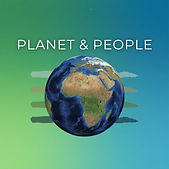'Save The Planet'... And Other Good Ideas
- Planet & People
- Oct 18, 2022
- 1 min read

“The future of humankind, and indeed all life on earth, depends on us”
David Attenborough
We’ve seen and heard a lot of “save the planet” in our time. It’s easy to get numb to it. Three words with MASSIVE meaning that can end up sounding really commonplace and mundane.
Children use this phrase a lot when we’re talking to them about the climate and nature crisis. We try to encourage impactful and practical action. Focussing on more specific and local ways to help nature and the environment can often make individual aims more achievable.
What does ‘saving the planet’ look like if you break it down to an individual or a school level?
Action | What could this look like in schools? | How does it ‘save the planet’? |
Planting and growing trees | Every class could plant a tree each year and nurture it throughout their time in school; track its growth and observe its impact on the space around it - attracting plants and animals to your school site as you create a new habitat. | Planting trees has come under a lot of criticism for being bandied about as ‘The Answer’ to the climate and nature crisis. We need lots of answers and action in all sectors and spaces. However, planting trees is a great place to start. Trees benefit us all by taking up carbon dioxide and helping to clean the air. Trees are home to vast numbers of other living things, attracting more life to your school site. Habitat loss is given as the main reason for our decline in wildlife - removing places and spaces for wildlife to exist. Giving space back makes a difference. Not just planting, but growing trees really does help. |
Reducing single use plastic | Once a week, a school could introduce a single use plastic free day. Avoiding plastic wrapped snacks and food in lunch boxes, tuck shop and even thinking about avoiding it when purchasing school resources, all helps. | Plastic use is a huge problem on this planet. We use it so casually and it really is everywhere. Studies are showing that it’s in the air we breathe and in the deepest parts of our oceans. We need to try and use less - especially soft plastics which are much harder to recycle. Bringing it in as a weekly target helps people get used to a behaviour shift, begin new habits and discover that it’s easier to do than they thought. |
Reusing uniform | Set up a second hand uniform shop - this can be a physical or a virtual shop. Good quality uniform can be sold cheaply, raising funds for the school, reducing expensive uniform costs for families and avoiding perfectly good clothes from going to waste. | Many synthetic clothes are made from plastic - a fleece top is plastic! Ending up in landfill or in an incinerator is problematic and wasteful if it has still got plenty of wear left in it. Our throw away culture is out of hand and using things until the end of their life is a huge part of shifting this culture towards positive action. |
Encouraging wildlife | This one is easy because ideally this means just leaving things alone - creating quiet, wild places where nature can thrive. Bird feeders and bug hotels are great, but it can be as simple as leaving the edge of the playing field unmown, leaving piles of logs around etc. | In the UK, we have seen a 68% drop in population sizes of mammals, birds, amphibians, reptiles and fish since 1970. That is staggering and it is mainly driven by habitat loss. Anything we can do to take back land space for nature helps and this is sometimes as simple as just removing our activity/presence to let other living things move in. |
Litter picking | We’ve seen this done in a few ways at schools - some schools set aside a lunch break once a week and take it in turns for classes to litter pick around school or the local area. Other schools combine walking to a swimming lesson with a litter pick on the way, or a school trip with litter picking incorporated into it. | Our seas and rivers receive what is on our land surfaces - if that’s plastic bottles and tin cans… we’ve all seen images of sea life suffering when it comes into contact with our rubbish. Picking it up goes some way to addressing this problem. Often plastic gets brittle when exposed to sunlight and so breaks down into smaller and smaller pieces which means it gets ingested by both land and sea creatures. Let’s try to clean it up before it gets the chance to be a part of our water systems. |
‘Saving the planet’ - a MASSIVE concept - simple changes collectively make a MASSIVE difference.
Planet & People is a Community Interest Company that aims to empower the next generation to create a better future for planet and people. We run fully funded workshops in schools in Devon - get in touch with us if you need support with environmental education at your school.

.jpg)






Comments